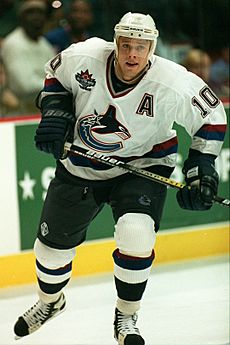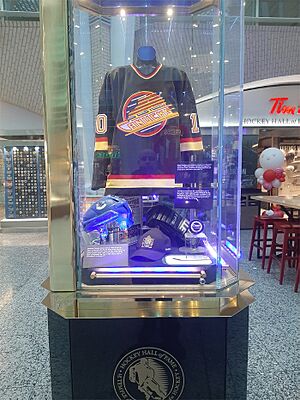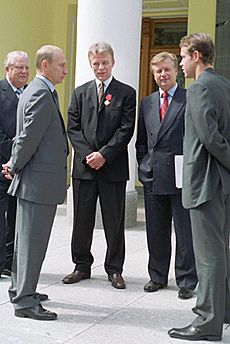Pavel Bure facts for kids
Quick facts for kids Pavel Bure |
||||||||||||||||||||||||||||||||||||||||||||||||||||||||||||||||
|---|---|---|---|---|---|---|---|---|---|---|---|---|---|---|---|---|---|---|---|---|---|---|---|---|---|---|---|---|---|---|---|---|---|---|---|---|---|---|---|---|---|---|---|---|---|---|---|---|---|---|---|---|---|---|---|---|---|---|---|---|---|---|---|---|
| Hockey Hall of Fame, 2012 | ||||||||||||||||||||||||||||||||||||||||||||||||||||||||||||||||
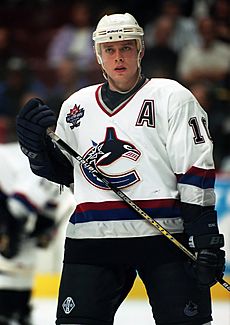
Bure with the Vancouver Canucks in 1997
|
||||||||||||||||||||||||||||||||||||||||||||||||||||||||||||||||
| Born | 31 March 1971 Moscow, Russian SFSR, Soviet Union |
|||||||||||||||||||||||||||||||||||||||||||||||||||||||||||||||
| Height | 5 ft 10 in (178 cm) | |||||||||||||||||||||||||||||||||||||||||||||||||||||||||||||||
| Weight | 191 lb (87 kg; 13 st 9 lb) | |||||||||||||||||||||||||||||||||||||||||||||||||||||||||||||||
| Position | Right wing | |||||||||||||||||||||||||||||||||||||||||||||||||||||||||||||||
| Shot | Left | |||||||||||||||||||||||||||||||||||||||||||||||||||||||||||||||
| Played for | CSKA Moscow Vancouver Canucks Spartak Moscow EV Landshut Florida Panthers New York Rangers |
|||||||||||||||||||||||||||||||||||||||||||||||||||||||||||||||
| National team | ||||||||||||||||||||||||||||||||||||||||||||||||||||||||||||||||
| NHL Draft | 113th overall, 1989 Vancouver Canucks |
|||||||||||||||||||||||||||||||||||||||||||||||||||||||||||||||
| Playing career | 1987–2003 | |||||||||||||||||||||||||||||||||||||||||||||||||||||||||||||||
|
Medal record
|
||||||||||||||||||||||||||||||||||||||||||||||||||||||||||||||||
Pavel Vladimirovich Bure (born March 31, 1971) is a Russian former professional ice hockey player. He played as a right wing. People called him "the Russian Rocket" because of his incredible speed on the ice.
Pavel Bure played for 12 seasons in the National Hockey League (NHL). He was with the Vancouver Canucks, Florida Panthers, and New York Rangers between 1991 and 2003. Before joining the NHL, he trained in the Soviet Union and played three seasons for the Central Red Army team.
The Vancouver Canucks picked Bure 113th overall in the 1989 NHL Entry Draft. He started his NHL career in the 1991–92 season. He won the Calder Memorial Trophy as the league's best rookie. Later, he led the NHL in goal-scoring in 1993–94. He also helped the Canucks reach the 1994 Stanley Cup Finals.
After seven seasons, the Canucks traded Bure to the Florida Panthers. There, he won two Rocket Richard Trophies in a row. This award goes to the league's top goal-scorer. Pavel Bure faced many knee injuries during his career. These injuries led to his retirement in 2005, even though he had not played since 2003.
He scored more than one point per game in his NHL career. He had 779 points, including 437 goals, in 702 NHL games. He is also fourth all-time in goals per game. In June 2012, Bure was chosen for the Hockey Hall of Fame. In 2017, an NHL group named him one of the 100 Greatest NHL Players ever.
Pavel Bure also played for his country. He competed for the Soviet Union and Russia. With the Soviet Union, he won two silver medals and one gold at three World Junior Ice Hockey Championships. He also won a gold and a silver medal at the 1990 and 1991 World Championships.
After the Soviet Union broke up in 1991, Bure played for Russia in two Winter Olympics. He won a silver medal at the 1998 Games in Nagano as team captain. He also won a bronze medal at the 2002 Games in Salt Lake City. After retiring in 2005, Bure became the general manager for Russia's national team at the 2006 Winter Olympics in Turin. In 2012, the International Ice Hockey Federation (IIHF) honored him for his international career. He was inducted into the IIHF Hall of Fame.
Contents
Early Life and Hockey Dreams
Pavel Bure was born in Moscow in 1971. His father, Vladimir Bure, was a famous Russian swimmer. Vladimir hoped Pavel would become a professional swimmer too. But Pavel loved hockey from a young age.
When he was six, Pavel tried out for the CSKA Moscow hockey school. He had only played ball hockey on the streets and wasn't a great skater yet. His father told him he needed to improve a lot in two months, or he would have to leave the school. Pavel worked hard and by age 11, he was named the best forward in his league.
In July 1982, when Pavel was about 11, he was chosen for a special TV show. He got to practice with hockey legends Wayne Gretzky and Soviet goalie Vladislav Tretiak. This was a big moment for a young player.
When Pavel was 12, his parents separated, and he stayed with his mother. By the time he was 14, he was playing for the Central Red Army's junior team. In 1991, he moved to North America with his father and brother, Valeri Bure. He was starting his NHL career with the Vancouver Canucks. His mother joined them two months later. They first lived in Los Angeles. His father continued to train both Pavel and Valeri in hockey.
In December 1986, Pavel toured Canada with the Soviet national midget (under-15) team. He played his first game at the Pacific Coliseum in Vancouver. This was the same rink where he would later make his NHL debut with the Canucks. He also met Wayne Gretzky and Paul Coffey again when his team played in Edmonton.
Playing Career Highlights
Starting with CSKA Moscow (1987–1991)
Pavel Bure began his professional hockey career at age 16 with CSKA Moscow. He joined the senior team's training camp for the 1987–88 season. He was considered too young for the Soviet League at first. But he got some playing time when regular players were absent. He played his first game in September 1987 and scored his only goal in that game.
Bure joined the team full-time in 1988–89. He scored 17 goals, which was a record for rookies in the Soviet League. This record lasted for 18 years. He also had 9 assists for 26 points and was named the league's rookie of the year. His success helped CSKA Moscow win their thirteenth straight Soviet championship in 1989. They also won the IIHF European Champions Cup for the twelfth time in a row.
At CSKA, Bure played with future NHL stars like Sergei Fedorov and Alexander Mogilny. These three formed a promising line for coach Viktor Tikhonov. However, this line didn't last long. Mogilny left to play for the Buffalo Sabres in 1989, and Fedorov joined the Detroit Red Wings the next year.
In his third and final season with the Red Army, Bure tied for the team lead in scoring with 46 points. He scored 35 goals, which was second in the league. In August 1991, Bure turned down a new contract with CSKA. Because of this, he was not chosen for the Soviet team for the Canada Cup.
Joining the NHL (1989–1991)
Before the 1989 NHL Entry Draft, many experts thought Pavel Bure was a spectacular player. They said he had amazing speed. NHL teams were worried he might not leave the Soviet Union to play in the NHL. This made teams hesitate to pick him early.
The Vancouver Canucks picked Bure 113th overall in the sixth round. This pick was surprising because many thought he wasn't eligible yet. To be picked after the third round, a player needed to have played at least two seasons with 11 games each for an elite Soviet club. The Canucks' head scout, Mike Penny, found out Bure had played extra exhibition and international games. This made him eligible for a late-round pick a year early.
Other teams were also interested in Bure. The Detroit Red Wings even asked about his eligibility but were told he wasn't. After the Canucks picked Bure, other teams complained. The league president, John Ziegler, first said the pick was illegal. But the Canucks appealed, showing proof of Bure's extra games. The pick was finally approved just before the 1990 NHL Entry Draft.
Bure left Moscow with his father and brother on September 6, 1991. They stayed in Los Angeles for a while. The Canucks started working on a contract with Bure. They also had to settle his existing contract with the Central Red Army. In October 1991, the Canucks and Soviet officials met in a Detroit court. The Canucks offered $200,000. Bure himself added another $50,000, making the total $250,000. The Soviet officials accepted. Bure then signed a four-year contract worth about $2.7 million. This deal made him the Canucks' second-highest paid player.
Playing for the Vancouver Canucks (1991–1999)
Bure's debut with the Canucks was delayed until November 1991. His first practice in Vancouver on November 3, 1991, drew about 2,000 fans! He played his first game on November 5, 1991, a 2–2 tie against the Winnipeg Jets. He didn't score, but he showed off his amazing speed. A newspaper columnist called him "the fastest Soviet creation since Sputnik." This helped create his nickname, "the Russian Rocket."
In his third game, Bure got his first NHL point, an assist. In his next game, he scored his first two NHL goals. He finished his first season with 34 goals and 60 points in 65 games. He scored 22 of those goals in his last 23 games.
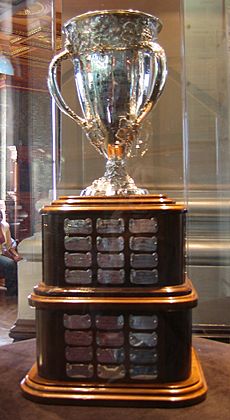
In the 1992 Stanley Cup Playoffs, Bure scored his first NHL hat trick in game six against the Winnipeg Jets. The Canucks won that series. Bure finished his first playoffs with six goals and 10 points in 13 games. He won the Calder Memorial Trophy as the rookie of the year. He thanked his linemate, Igor Larionov, for his help. Bure's Calder Trophy was the first major individual NHL award for the Canucks team.
Bure had an even better season in 1992–93. He scored 60 goals for the first time. In one game, he scored a career-high four goals against the Winnipeg Jets. He also set a team record for most goals in a period. He played in his first NHL All-Star Game in 1993 and scored two goals. He finished the season with 110 points in 83 games. He became the first Canuck named to the NHL first All-Star team. His 110 points was a team record for many years.
In the 1993-94 season, Bure led the league in goal-scoring again with 60 goals. He became only the eighth player in NHL history to score 60 goals in two seasons in a row. He scored 49 goals and 78 points in his final 51 games. This helped the Canucks make it to the 1994 playoffs.
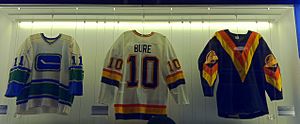
The Canucks made an amazing run to the 1994 Stanley Cup Finals. In game seven of the first round against the Calgary Flames, Bure scored a famous goal in double overtime to win the series. He finished the playoffs with a team-high 16 goals and 31 points in 24 games. The Canucks lost to the New York Rangers in seven games in the Finals.
After that season, the Canucks re-signed Bure to a five-year contract. This made him one of the highest-paid players in the league.
Due to the 1994–95 NHL lockout, Bure played a few games in Russia and Germany. When the NHL season started, he scored 43 points in 44 games. In the 1995 playoffs, Bure set team records for most goals and points in a series. The Canucks won that series but were then swept by the Chicago Blackhawks. This was the last time Bure played in the playoffs with the Canucks.
At the start of the 1995–96 season, Bure changed his jersey number from 10 to 96. This was to remember September 6, 1991, the day he arrived in North America.
On November 9, 1995, Bure suffered a serious knee injury in a game against the Chicago Blackhawks. He tore a ligament in his right knee and needed surgery. This injury kept him out for the rest of the season.
Bure returned for the 1996–97 season. He had a neck injury early in the season but kept playing. He finished with 55 points in 63 games, which was lower than his usual. The Canucks missed the playoffs that year.
In the 1997–98, Bure switched back to number 10. He had a great season, scoring 51 goals. This was his first 50-goal season since 1994. He also had 39 assists for 90 points, ranking him third in the NHL.
After the 1997–98 season, Bure told the Canucks' general manager that he would not play for the team again. He said he had "personal reasons." Bure did not report to the team the next season. He went back to Moscow to practice with his old team.
Time with the Florida Panthers (1999–2002)
Bure was traded to the Florida Panthers on January 17, 1999. He debuted with his new team on January 20, 1999. He played on an all-Russian line and scored two goals. Soon after, he re-injured his knee, which kept him out for three weeks. Despite the injury, the Panthers signed him to a big five-year contract. Another injury ended his season after only 11 games with Florida.
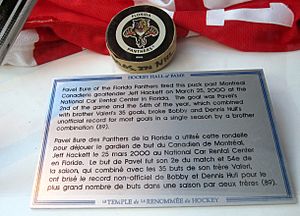
In 1999–2000, his first full season with the Panthers, Bure led the league in goal-scoring. He won his first of two Rocket Richard Trophies with 58 goals. He also had 36 assists for 94 points. Both his 58 goals and 94 points set new franchise records for the Panthers. He helped Florida make the playoffs, but they were swept by the New Jersey Devils. Bure was named to the NHL second All-Star team.
Bure won the league scoring title again in 2000–01 with 59 goals. This was the fifth and final time he reached the 50-goal mark. However, the Panthers missed the playoffs that year. Bure set a league record by scoring 29.5% of his team's total goals that season.
Before the 2001–02 season, the Panthers traded for Bure's brother, Valeri. This was the first time the brothers played on the same team. However, Pavel injured his groin in the pre-season. At the trading deadline, Bure was traded to the New York Rangers. He led the Panthers in scoring for three seasons in a row.
Playing for the New York Rangers (2002–2003)
The New York Rangers acquired Bure on March 18, 2002. He made his Rangers debut the next day against his old team, the Vancouver Canucks, and scored a goal. He scored 12 goals and 20 points in 12 games after the trade. He finished the season with 34 goals and 69 points combined.
Bure suffered another knee injury in the 2002–03 pre-season. He missed the first three games. After returning, he had 14 goals and 21 points in 27 games. But a collision in December forced him out again. He had surgery for a torn meniscus in his left knee. Bure played in 39 games that season, scoring 19 goals and 30 points.
Due to his knee injury, Bure did not play in the 2003–04. He failed a pre-season physical and was declared unable to play.
Retirement from Hockey
Bure remained inactive for another season because of the 2004–05 NHL lockout. After the NHL started playing again for the 2005–06 season, he announced his retirement. He held a press conference in Moscow on November 1, 2005. He said his ongoing knee injuries made it impossible to play at an elite level.
Because Bure had not played since the 2002–03 season, he was eligible for the Hockey Hall of Fame right after he retired. On June 27, 2012, he was voted into the Hall of Fame. He became the fifth Soviet or Russian player to be inducted. He was also the first player to spend most of his career with the Canucks to enter the Hall.
The Canucks retired Bure's number 10 jersey on November 2, 2013. The day before, the team announced they would rename their Most Exciting Player Award to the Pavel Bure Most Exciting Player Award in his honor.
International Hockey Career
Junior Tournaments
Before joining the NHL, Bure played for the Soviet Union in several junior tournaments. His first was the 1988 Quebec Esso Cup, an under-17 tournament, where he won a gold medal. That same year, he won a bronze medal at the European Junior Championships.
The next year, Bure played in his first World Junior Championships at age 17. He played on a top line with Alexander Mogilny and Sergei Fedorov. They led the Soviet Union to a gold medal. Bure's eight goals tied him for the tournament lead. He was named to the Tournament All-Star team and won Best Forward honors. He also helped the Soviet Union win gold at the 1989 European Junior Championship.
Bure competed in his second World Juniors in 1990, winning a silver medal. He scored seven goals in seven games. Later that year, he played for the senior Soviet national team at the 1990 World Championships. He helped the Soviets win a gold medal. He also won gold at the 1990 Goodwill Games.
In 1991, Bure played in his third and final World Junior Championships. He was the leading scorer with 12 goals in 7 games, and the Soviets won the silver medal. He finished his World Junior career with a record 27 goals in 21 games. Bure also played in the 1991 World Championships, where he helped the Soviets win a bronze medal. This was the last World Championships for the USSR before the country dissolved.
Senior Tournaments
Bure was supposed to play for the Soviet Union at the 1991 Canada Cup. However, he was left off the team after he turned down a contract with his Russian club.
Bure played his first international tournament for Russia in preliminary games for the 1996 World Cup. He had just recovered from knee surgery. He was reunited on a line with Fedorov and Mogilny, which was very exciting. But Bure got another injury and missed the main tournament.
Two years later, Bure made his Olympic debut with Russia at the 1998 Winter Games in Nagano. He scored five goals in Russia's semifinal win against Finland, helping his team reach the gold medal game. The Russians lost to the Czech Republic and won silver. Bure finished with a tournament-high nine goals and was named the top forward.
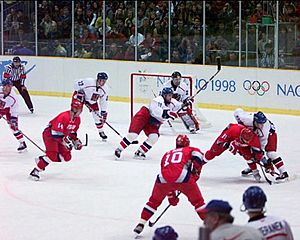
Bure's next international tournament was the 2000 World Championships. The Russians finished eleventh. Two years later, Bure played in his second Olympic Games at the 2002 Games in Salt Lake City. He played with a fractured hand. He scored two goals and an assist, and Russia won the bronze medal. This was his final international tournament as a player.
After he retired in 2005, Bure was named Russia's Olympic general manager. He chose the team for the 2006 Winter Olympics in Turin. The Russians did not win a medal. In December 2011, Bure was announced as one of the 2012 inductees into the International Ice Hockey Federation Hall of Fame.
Playing Style
Pavel Bure's playing style showed the speed, skill, and puck control common in Soviet hockey. His amazing skating speed, agility, and quickness were the most important parts of his game. This is why he was called the "Russian Rocket." He used his speed to get away from defenders and to skate the whole length of the ice.
In a 1993 poll of NHL coaches, Bure was named the league's best skater. One coach said, "Bure has the best combination of speed, agility, and balance." His skating was also great because he could trick defenders and goalies while moving very fast. However, several knee injuries later affected his speed.
Early in his career, Bure was also known for playing well on both offense and defense. He was good at creating chances when his team was shorthanded (on the penalty kill). He would pressure opponents with his quickness. Coaches also voted him as one of the best penalty killers and stickhandlers in the NHL.
Sports writers described Bure as a "two-way dynamo" during the 1994 Stanley Cup playoffs. They praised his defensive skills and his creativity. They called him "the most explosive player in the sport." His teammate, Cliff Ronning, said, "He makes everybody on our team better."
During his time with the Canucks, fans voted Bure the team's Most Exciting Player a record five times. Trevor Linden, who played with Bure, said he had never seen a player who could get people out of their seats like Bure. The Canucks later renamed this award the Pavel Bure Most Exciting Player Award in his honor.
Bure is known as a pure goal scorer. He reached the 50-goal mark five times and the 60-goal mark twice. His average of 0.623 goals per game is third among the top 100 goal scorers in NHL history.
Personal Life
Family Background
Pavel Bure comes from a family of athletes. His father, Vladimir Bure, was an Olympic swimmer for the Soviet Union. He won four medals in the 1968, 1972, and 1976 Olympic Games. Pavel kept his father as his personal trainer for many years.
Pavel's paternal grandfather, Valeri Bure, was a goalkeeper for the national water polo team. Pavel's younger brother, Valeri Bure, was also a hockey player. He played 10 years in the NHL. The two brothers played together briefly for the Florida Panthers and at the 1998 and 2002 Winter Olympics.
The Bure family made valuable watches for the Russian tsars from 1815 to 1917. Pavel was named after his great-grandfather, who was a watchmaker for Tsar Alexander III. The family was given noble status because of their work for the imperial family. After his first knee injury in 1995, Bure tried to restart the family watchmaking business.
Relationships and Family
Pavel Bure married Alina Khasanova on October 10, 2009, in Moscow. They had known each other for four years. They have three children: Pavel Jr., Palina, and Anastasia. Pavel Jr. was born on April 23, 2013. Palina was born on July 20, 2015. Their third child, Anastasia, was born on December 28, 2018.
Bure is known to have played ice hockey often with Russian president Vladimir Putin. However, he has said he does not have any political ambitions himself.
Career Statistics
Regular Season and Playoffs
Bold indicates led league
| Regular season | Playoffs | |||||||||||||
|---|---|---|---|---|---|---|---|---|---|---|---|---|---|---|
| Season | Team | League | GP | G | A | Pts | PIM | GP | G | A | Pts | PIM | ||
| 1987–88 | CSKA Moscow | Soviet | 5 | 1 | 1 | 2 | 0 | — | — | — | — | — | ||
| 1988–89 | CSKA Moscow | Soviet | 32 | 17 | 9 | 26 | 8 | — | — | — | — | — | ||
| 1989–90 | CSKA Moscow | Soviet | 46 | 14 | 10 | 24 | 20 | — | — | — | — | — | ||
| 1990–91 | CSKA Moscow | Soviet | 44 | 35 | 11 | 46 | 24 | — | — | — | — | — | ||
| 1991–92 | Vancouver Canucks | NHL | 65 | 34 | 26 | 60 | 30 | 13 | 6 | 4 | 10 | 14 | ||
| 1992–93 | Vancouver Canucks | NHL | 83 | 60 | 50 | 110 | 69 | 12 | 5 | 7 | 12 | 8 | ||
| 1993–94 | Vancouver Canucks | NHL | 76 | 60 | 47 | 107 | 86 | 24 | 16 | 15 | 31 | 40 | ||
| 1994–95 | Spartak Moscow | IHL | 1 | 2 | 0 | 2 | 2 | — | — | — | — | — | ||
| 1994–95 | EV Landshut | DEL | 1 | 3 | 0 | 3 | 2 | — | — | — | — | — | ||
| 1994–95 | Vancouver Canucks | NHL | 44 | 20 | 23 | 43 | 47 | 11 | 7 | 6 | 13 | 10 | ||
| 1995–96 | Vancouver Canucks | NHL | 15 | 6 | 7 | 13 | 8 | — | — | — | — | — | ||
| 1996–97 | Vancouver Canucks | NHL | 63 | 23 | 32 | 55 | 40 | — | — | — | — | — | ||
| 1997–98 | Vancouver Canucks | NHL | 82 | 51 | 39 | 90 | 48 | — | — | — | — | — | ||
| 1998–99 | Florida Panthers | NHL | 11 | 13 | 3 | 16 | 4 | — | — | — | — | — | ||
| 1999–2000 | Florida Panthers | NHL | 74 | 58 | 36 | 94 | 16 | 4 | 1 | 3 | 4 | 2 | ||
| 2000–01 | Florida Panthers | NHL | 82 | 59 | 33 | 92 | 58 | — | — | — | — | — | ||
| 2001–02 | Florida Panthers | NHL | 56 | 22 | 27 | 49 | 56 | — | — | — | — | — | ||
| 2001–02 | New York Rangers | NHL | 12 | 12 | 8 | 20 | 6 | — | — | — | — | — | ||
| 2002–03 | New York Rangers | NHL | 39 | 19 | 11 | 30 | 16 | — | — | — | — | — | ||
| Soviet totals | 127 | 67 | 31 | 98 | 52 | — | — | — | — | — | ||||
| NHL totals | 702 | 437 | 342 | 779 | 484 | 64 | 35 | 35 | 70 | 74 | ||||
International Play
| Year | Team | Event | GP | G | A | Pts | PIM | |
|---|---|---|---|---|---|---|---|---|
| 1988 | Soviet Union | U17 | — | — | — | — | — | |
| 1988 | Soviet Union | EJC | 6 | 10 | 0 | 10 | 2 | |
| 1989 | Soviet Union | WJC | 7 | 8 | 6 | 14 | 4 | |
| 1989 | Soviet Union | EJC | 6 | 5 | 6 | 11 | 4 | |
| 1990 | Soviet Union | WJC | 7 | 7 | 3 | 10 | 10 | |
| 1990 | Soviet Union | WC | 10 | 2 | 4 | 6 | 10 | |
| 1990 | Soviet Union | GG | 5 | 4 | 1 | 5 | — | |
| 1991 | Soviet Union | WJC | 7 | 12 | 3 | 15 | 31 | |
| 1991 | Soviet Union | WC | 10 | 3 | 8 | 11 | 2 | |
| 1998 | Russia | OLY | 6 | 9 | 0 | 9 | 2 | |
| 2000 | Russia | WC | 6 | 4 | 1 | 5 | 10 | |
| 2002 | Russia | OLY | 6 | 2 | 1 | 3 | 8 | |
| Junior totalsa | 33 | 42 | 17 | 59 | 51 | |||
| Senior totalsb | 38 | 20 | 14 | 34 | 32 | |||
a does not include 1988 Quebec Esso Cup (U17)
b does not include the 1990 Goodwill Games
Awards and Honours
| Award | Year |
|---|---|
| NHL | |
| Calder Memorial Trophy | 1992 |
| NHL All-Star Game | 1993, 1994, 1996, 1997, 1998, 2000, 2001 |
| NHL First All-Star Team | 1994 |
| NHL Second All-Star Team | 2000, 2001 |
| NHL All-Star Game MVP | 2000 |
| Maurice "Rocket" Richard Trophy | 2000, 2001 |
| Hockey Hall of Fame | 2012 |
| One of 100 Greatest NHL Players | 2017 |
| Vancouver Canucks | |
| Most Exciting Player Award | 1992, 1993, 1994, 1995, 1998 |
| Molson Cup | 1992, 1993, 1994, 1998 |
| Cyrus H. McLean Trophy | 1993, 1994, 1995, 1998 |
| Cyclone Taylor Trophy | 1993, 1994, 1998 |
| International | |
| WJC best forward | 1989 |
| WJC All-Star team | 1989 |
| World Championship second All-Star team | 1991 |
| Winter Olympics best forward | 1998 |
| IIHF Hall of Fame | 2012 |
| Soviet | |
| IIHF European Champions Cup winner | 1988, 1989, 1990 |
| Soviet champion | 1988, 1989 |
| Soviet Championship League Rookie of the Year | 1989 |
Records
Team Records
Vancouver Canucks
- Vancouver Canucks' single-season record, most points by a rookie – 60 in 1991–92 (tied with Ivan Hlinka, 1981–82 and Elias Pettersson, 2018–19)
- Vancouver Canucks' single-season record, most goals – 60 in 1992–93 and 1993–94
- Vancouver Canucks' all-time playoffs record, most goals – 34 (tied with Trevor Linden)
- Vancouver Canucks' all-time record, most shorthanded goals – 24
- Vancouver Canucks' single-game record, most goals – four versus the Winnipeg Jets on October 12, 1992 (tied with Rosaire Paiement, Bobby Schmautz, Rick Blight, Petri Skriko, Greg Adams, Tony Tanti, Martin Gélinas, Markus Näslund, Daniel Sedin, and Brock Boeser)
Florida Panthers
- Florida Panthers' single-season record, most goals – 59 in 2000–01
International Records
- World Junior Championships all-time record, most goals – 27 in 21 games (1989–1991)
- Winter Olympics single-game record, most goals – five (1998; semifinal vs. Finland)
NHL Records
- NHL record, most goals scored in proportion to team – 29.5% of the Florida Panthers' goals in 2000–01.
Transactions
- June 9, 1989 – Drafted by the Vancouver Canucks in the sixth round, 113th overall, in the 1989 NHL Entry Draft.
- October 31, 1991 – Signed by the Vancouver Canucks to a four-year, $3.5 million contract.
- June 16, 1994 – Re-signed by the Vancouver Canucks to a five-year, $24.5 million contract.
- January 17, 1999 – Traded by the Vancouver Canucks, along with Bret Hedican, Brad Ference and Vancouver's third-round draft choice (Robert Fried) in 2000, to the Florida Panthers in exchange for Ed Jovanovski, Dave Gagner, Mike Brown, Kevin Weekes and Florida's first-round draft choice (Nathan Smith) in 2000.
- February 8, 1999 – Signed by the Florida Panthers to a five-year, $47.5 million deal.
- March 18, 2002 – Traded by the Florida Panthers, along with Florida's second-round draft choice in 2002 (Lee Falardeau), to the New York Rangers in exchange for Igor Ulanov, Filip Novak, the Rangers' first-round draft choice in 2002 (Eric Nystrom), the Rangers' second-round draft choice in 2002 (Rob Globke) and the Rangers fourth-round draft choice in 2003 (later traded to the Atlanta Thrashers; Atlanta selected Guillaume Desbiens).
See also
- List of NHL statistical leaders
- List of NHL players with 50-goal seasons
- List of NHL players with 100-point seasons
- Notable families in the NHL
 | Jewel Prestage |
 | Ella Baker |
 | Fannie Lou Hamer |


